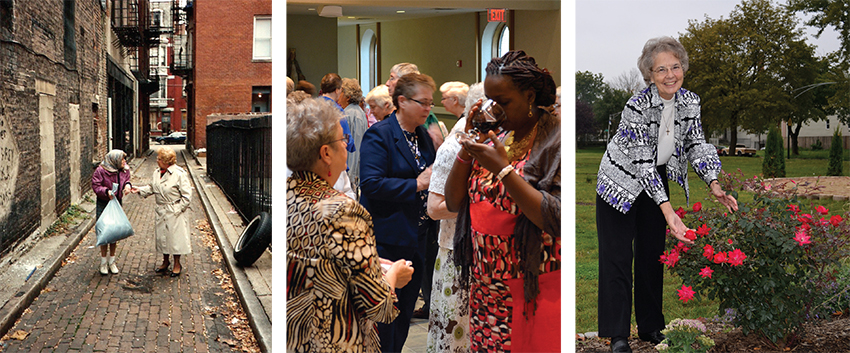 Left, Sister Kathleen Kelly worked with the poor in Cincinnati; contributed photo. Middle, Sister Mumbi Kigutha receives the Eucharist from Sister Karen Elliott during Mass at Salem Heights; Michelle Bodine photo. Right, Sister Donna Liette in her garden at the Precious Blood Ministry of Reconciliation in Chicago; Dave Eck photo.
Left, Sister Kathleen Kelly worked with the poor in Cincinnati; contributed photo. Middle, Sister Mumbi Kigutha receives the Eucharist from Sister Karen Elliott during Mass at Salem Heights; Michelle Bodine photo. Right, Sister Donna Liette in her garden at the Precious Blood Ministry of Reconciliation in Chicago; Dave Eck photo.
When people in our society think about the meaning of the word “relationship,” most of them probably consider their bond or association with those whom they love — family, friends and, hopefully, God.
The dictionary defines relationship as the way in which two or more concepts, objects or people are connected, and the way that living beings behave toward one another.
Our Precious Blood Spirituality calls us to a more complete understanding and practice of relationship — our interconnectedness with all creation — and how we care for, behave toward or influence people, as well as our interrelationship with and care of the living organisms and natural resources of the earth.
In Pope Francis’ encyclical Laudato Si’: On Care of Our Common Home, he calls this interconnectedness an integral ecology — where relationship with one another, with God and with creation are all vitally important. These relationships should be nourished and be made central in our lives so that we can recognize God’s revelation to us, which He does in the everyday routine of living.
Created in the image of God, we, and creation are precious. Pope Francis states in Laudato Si’, “Nature cannot be regarded as something separate from ourselves or as a mere setting in which we live. We are a part of nature. Strategies for our complex social and environmental crises demand an integrated approach to combating poverty, restoring dignity to the excluded, and at the same time, protecting nature.”
The pope tells us that “the whole” is greater than any one part. We need to approach solutions to our common problems across all sectors of our global society: social, political, cultural, environmental, economic, religious, etc. And our solutions must be based on a preferential option for, and an ethical relationship with, the poorest of our brothers and sisters.
All members of the community, educated or not, rich or poor, should be invited to active participation and dialogue in striving to achieve the “common good,” whereby all people are afforded the ability — through social peace, stability and security — to reach their full potential.
Most importantly, we are encouraged to be humble and to realize that we have much to learn from others who are very different from us. In fact, as messengers of reconciliation, we are called to see our differences as a source of enrichment. When we do that and when we bring our open heart and mind to the table, we succeed in forming and nurturing right relationships.
– Story by Colleen Kammer





